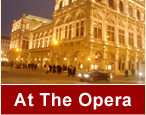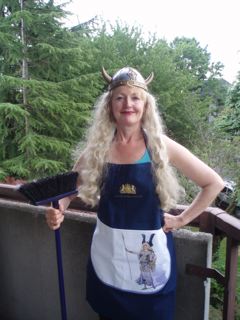|
Janette Griffiths |
|
|
AT THE OPERA Richard ist Leipziger 1 Mention Leipzig in a conversation and someone is bound at some point to close their
eyes, sigh and say "Ah yes the divine Johann Sebastian - the city of Bach." Well, yes and no, Bach was born in Eisenach.
His greatest champion, Felix Mendelssohn, is another name associated with Leipzig. He was born in Hamburg. But
there's another composer whose name does not seem to be instantly associated with Leipzig - and he was born there. "Richard ist Leipziger" Thomas Krakow, head of the Leipzig Wagner Society, likes to remind us. Yes, Wagner
left for Dresden at a young age and yes, once a grown man he was endlessly on the move, fleeing creditors, chasing unfulfilled
dreams of success in Paris and going on to find immense fame throughout the western world. Last year's 200th anniversary of his death gave Krakow and his fellow Leipzig Wagnerians a chance
to remind the world that this attractive, dynamic city is Wagner's home town. A Wagner Symposium was held, his early opera
"Die Feen" was performed and on 22 May itself, a big outdoor party was held on Richard Wagner Platz just yards away
from the chocolate shop. A new statue was erected just around
the corner from Richard Wagner Platz.It's an interesting and unusual work - with a very young Wagner in a blue frock coat
standing in front of a vast dark silhouette of himself - a shadow. Of the immense reknown that was to be his? Of the immense
talent contained inside that small frame? Or of the man's own shadow side? Of his reputation as an anti-Semite who work
would be hijacked by the Nazis years later? Only the viewer can decide. I'd be interested to hear your views. I was in Leipzig on February 13th and had the good fortune to join Wagner's tireless
local champion, Thomas Krakow, when he and the local Wagnerians laid a wreath in the composer's favourite fuschia colours
in front of a bust of Wagner behind the Leipzig Opera House. But
for a music lover with tastes broad enough to embrace both Bach and Wagner, perhaps the most moving moment of a visit to Leipzig
is a visit to Bach's tomb in the St Thomas Kirche. Just a few feet away is the font where Richard Wagner was baptized.... The Froth But Not the Coffee Last weekend took me on a last-minute press trip to Milan and Lake Como. More
about that later in "Journeys" when I can transfer my pictures to the Mac. But, for now a confession. My hotel, The Four Seasons, was a hundred yards from La Scala but
I could not make it to a performance. On the Friday night they were giving Massenet's "Manon" - never
a favourite and on the Saturday, Verdi's "Luisa Miller." I had no ticket and the press trip kept me out and
about and just far enough from the great temple of opera, on the Friday night, to feel that, if I cupped my hand
to my ear, I might even hear a few sublime voices echoing through the hot, turgid Milan night air. Saturday took me to Lake
Como, to a gorgeous resort called "Casta Diva" - once the home of legendary 19th century soprano, Giuditta Pasta
and just across the lake from a villa that once housed composer, Vincenzo Bellini. It is said that he could hear her rehearsing. I was far enough away by then for those fantasies of hearing present-day singers
to fade away. And the "Casta Diva" resort did their best to compensate by providing a young soprano and tenor to
serenade us during dinner. But the longing for La Scala was too great. I ate a starter, applauded the fine young singers,
looked at my watch and calculated that I could perhaps, just perhaps, find a way to sneak into the last act of "Luisa
Miller." My hosts saw my dilemma and provided a taxi. I rode the 50 minutes into Milan in the company of Luigi,
an articulate and informed driver, who told me stories of the "Clooneyisation" of Lake Como. More on that in "Journeys." Luigi and I arrived in town too late for that last act. I bid him farewell, and made my way to the great green doors of the opera
house. I pulled one open and stepped inside. La Scala's ushers, Le Maschere, as they are known, were standing around in
little groups waiting for their working evening to end. I was too late so what was I hoping for? "Can I just sneak into the ovations?" I heard myself asking
. "We can't do that," said an usher. "Please - just a
quick glance." This was tantalizing. I could hear a tenor off in the distance. I hadn't looked at the cast, hadn't
had the time but even through the thick walls, I sensed it was one of the greats. "Go on," I persisted, "just
a peek." I was advised to come back when the show was over in 15 minutes. I wandered outside for those 15 minutes. On
this late June night, the air was thick with heat and unmoving. Lovers kissed among the trees on the little piazza in front
of the theatre. The great glass-roofed 19th century Galleria arcade was quiet. Nearby a new gelato parlour beckoned but I
had my date with the ovations. When I returned to the
theatre, a kind young usher, ushered me into the auditorium. THAT
auditorium. The one that still somewhere in its ether, holds the echoes of voices from Caruso to Pavarotti. This is
the theatre that looks the way we all imagine a great opera theatre should look. Red velvet, gold filigree, chandeliers -
all wildly impractical for truly listening to and seeing an opera but this is La Scala and most of us don't care.
The singers came out for their bows. And sure enough, there was one of my
favourite tenors, the great Argentinian, Marcelo Alvarez.
And wonder of wonders, there was baritone, Leo Nucci, 70 years old and bowing to tumultuous applause. I joined in. How daft
is that? But by now I had realized that I was getting the froth if not the coffee in the cappuccino. And in Italy, how bad
could that be?
|
|
|
|






